#cook:たまねぎ
Explore tagged Tumblr posts
Photo

✿ はんぺん海老カツ たっぷりタルタルソースで♪ ✍️ 揚げない→パン粉空炒り→オーブン。触れない→ラップ。えび100g。タルタルソース→ギリシャヨーグルト大4+たまねぎ1/2+パプリカ1/4+粒マスタード小2+塩胡椒 📚 260kcal
#cook#cook:2025〜#cook:タルタルソース#cook:海老カツ#cook:えび#cook:えびカツ#cook:はんぺん#cook:えび×はんぺん#cook:魚介類#cook:主菜#cook:ギリシャヨーグルト#cook:たまねぎ#cook:たまねぎ×パプリカ#cook:粒マスタード#cook:粒マスタード×ヨーグルト#2025〜#260kcal#250kcal〜
0 notes
Text
Japanese "Onomatopoeia" 『オノマトペ/Onomatope)』
There are two types in Japanese Onomatopoeia. One is 「擬音語(ぎおんご/Gi-on-go)」 which is “written sound” as we hear, and the other is 「擬態語(ぎたいご/Gi-tai-go)」 which is “written sound of status” as we look or feel.
1) 「擬音語(ぎおんご/Gi-on-go)」: “sound” onomatopoeias
As examples, let’s compare onomatopoeias for some animal sounds in Japanese and English.
犬(いぬ/Inu)「ワンワン(Wan-wan)」 Dog: “Woof woof” “Bow-wow”
猫(ねこ/Neko)「ニャー(Nyaa)」 Cat: “Meow”
牛(うし/Ushi)「モー(Moo)」 Cow: “Moo”
豚(ぶた/Buta)「ブーブー(Buu-buu)」 Pig: “Oink oink”
にわとり(Niwatori)「���ケコッコー(Kokekokkoo)」Rooster: “Cock-a-doodle-doo”
2) 「擬態語(ぎたいご/Gi-tai-go)」 “status” onomatopoeias
This type is onomatopoeias of “status”. An easy-to-understand example is “わくわく(Waku-waku)” which became famous through “SPY x FAMILY.” “Waku-waku” means being excited or thrilled about something you look forward to. Although the status does not have that sound, we can imagine Anya’s facial expression and emotions just by seeing the word.
By using onomatopoeias, we can describe the situation or the person’s feelings in detail with simple and short words. For example, if you want to say “It’s raining,” here are some onomatopoeias, from the lightest to the heaviest;
①「雨(あめ/Ame)がポツリポツリ(Potsuri-potsuri)と降(ふ/Fu)っている」…Raindrops are falling at intervals.
②「雨がポツポツ(Potsu-potsu)降っている」…Just a few raindrops are falling.
③「雨がパラパラ(Para-para)降っている」…Raindrops are falling continuously
④「雨がしとしと(Shito-shito)降っている」…It’s quiet, but certainly raining continuously.
⑤「雨がザーザー(Zaa-zaa)降っている」…It’s raining hard and making a fair amount of noise.
⑥「雨がドシャドシャ(Dosha-dosha)降っている」…It’s raining dangerously hard.
Onomatopoeias have existed since before manga and anime existed, but manga has made us more familiar with them, and they have enabled us to share delicate expressions with visual images using just a few words. So I think you’ll be familiar with them naturally while watching anime or manga, without extra effort to memorize them.
Hereunder I’ll pick up some lines with onomatopoeias from Season 1 episodes;
―――――――――――――――――――――――――――
From Episode 1 : Maomao
猫猫「たかがウワサ話に何を真剣になってるんだ。こんなのは、ただの憶測にすぎない。すぎないが…ちいとばかし、行ってみるか。そそそそそ…」
Maomao “Takaga uwasa-banashini nanio shinkenni natterunda. Konnanowa tadano okusokuni suginai. Suginaiga…chiito-bakashi itte-miruka. Sososososo…”
Maomao “Why am I taking a rumor so seriously? It’s all just conjecture. But still… I guess I can take a quick peek.”
Episode 13 : Serving in the Outer Court
壬氏「勉強の方はやっているのか?」
Jinshi “Benkyono-howa yatte iru-noka?”
Jinshi “Are you studying?”
猫猫「そそそそそ…」
Maomao “Sososososo…”
Maomao “Sneak, sneak.”
壬氏「おい!」
Jinshi “Oi!”
Jinshi “Hey!”
猫猫「そそそそそ…」
Maomao “Sososososo…”
Maomao “Sneak, sneak!”
「そそそそそ…」: sneak, sneak. (This onomatopoeia might be newly created in this anime.)
―――――――――――――――――――――――――――――――
From Episode 4 : The Threat
猫猫「ぴょーん、ぴょん。仕方ない。もう一度、作り直すか」
Maomao “Pyōn, pyon. Shikata nai. Mo ichido, tsukuri-naosuka.”
Maomao “Boing boing. Oh, well. Guess I have to cook it again.”
「ぴょん(Pyon)」: Jumping, 「ぴょーん(Pyoon)」: Jumping (higher or longer)
―――――――――――――――――――――――――――
From Episode 5 : Covert Operations
やぶ医者「お待たせしました、壬氏さ…しゅん」
Yabu Isha “Omatase shimashita, Jinshi-sa……Shun.”
Quack Doctor “Thank you for waiting, Master Jinshi- Oh.”
「しゅん(Shun)」: Get disappointed and depressed a little
―――――――――――――――――――――――――――
Episode 6 : The Garden Party
貴園「実際、若いの。だって、主上様を産んだのが…こしょこしょこしょ」
Guien “Jissai, wakaino. Datte, shujo-samao unda-noga… Kosho-kosho-kosho.”
Guiyuan “She is young. She gave birth to the emperor when she was…”!”
「こしょこしょ(Kosho-kosho)(with more comical nuance)」「こそこそ(Koso-koso)」: Talking in secret
―――――――――――――――――――――――――――
From Episode 6 : The Garden Party
桜花「ムカ~ッ!」
Infa “Mukaaa!”
Yinghua “Grr!”
桜花「キ~ッ!猫猫に謝りなさいよ!!」
Infa “Kiii! Maomaoni ayamari-nasaiyo!!”
Yinghua “Apologize to Maomao!”
「ムカッ(Muka)」 「ムカーッ(Mukaa)」「キーッ(Kiii)」: Getting angry
―――――――――――――――――――――――――――
From Episode 6 : The Garden Party
猫猫(へえ…こうして見ると、なかなか…。思ったより、お偉いさんなのか。やはり、武官に交ざっても違和感がない。
へえ、さっきの武官も、末席だが、年齢を考えると出世頭か?あのキラキラした宦官はいないけど、まあ、どうでもいい。お��、それより毒見だ)
Maomao (Hee… Koshite miruto, naka-naka… Omotta-yori, oerai-san nanoka. Yahari, bukanni mazattemo iwakanga nai. Hee, sakkino bukanmo, masseki-daga, nenreio kangaeruto shusse-gashiraka? Ano kira-kira shita kanganwa inai-kedo, maa do demo ii. O, soreyori, dokumi-da.)
Maomao (He looks pretty good there. I guess he’s higher up than I thought. He doesn’t seem out of place among the military officers. Oh look, that officer from earlier. He’s at the very edge, but given his age, I guess that’s still impressive? Our glittering eunuch isn’t there, but who cares? More importantly, food tasting.)
猫猫(…新しいかんざし。宦官もかんざしをもらうのか。そういえば、襟も少し乱れてる。いつものキラキラさもない。うっ、宴席で姿を見ないと思ったら、そういうことか。でも、今なら年相応の青年に…というか、だいぶ幼く見える。こちらのほうが、まだいいな)
Maomao (…Atarashii kanzashi. Kanganmo kanzashio morau-noka. So-ieba, erimo sukoshi midareteru. Itsumono kira-kirasamo nai. U, ensekide sugatao minaito omottara, so-iu Kotoka. Demo, imanara toshi-so’o-no seinenni… to iuka daibu osanaku mieru. Kochirano-hoga mada iina.)
Maomao (A new hairpin? So the eunuchs gets hairpins, too? His collar is a little disheveled, too. Plus his normal glitter is gone. Is that why he wasn’t at the party? But right now, he’s acting his age more than usual… Or rather, he looks quite a bit younger. I prefer him like this, somewhat.”
猫猫(しおらしい。無茶なことを言っているのは承知の上か。いつも通り、無駄にキラキラしてればいいのに。ここ最近の壬氏様は、以前よりもずっと子供のように見えて仕方ない)
Maomao (Shiorashii. Muchana koto’o itte-irunowa shochino ueka. Itsumo-doori, mudani kira-kira shitereba iinoni. Koko saikinno Jinshi-samawa, izen-yorimo zutto kodomono-yoni miete shikata-nai.)
Maomao (How modest. He realizes he’s asking for the impossible. He should just be excessively shiny like his usual self. For a while now, Master Jinshi has seemed much more childish than before.)
―――――――――――――――――――――――――――――――
From Episode 7 : Homecoming
猫猫「チョキチョキチョキ…カチャカチャカチャ」
Maomao “Choki choki choki… Kacha kacha kacha.”
Maomao “Clip clip clip. Clunk clunk clunk.”
―――――――――――――――――――――――――――――――
From Episode 7 : Homecoming
猫猫「シャーッ!」
Maomao “Shaaaaa!”
Episode 14 : The New Pure Consort
猫猫(ハッ!大事な教材を見せるわけにはいかない!)「シャーッ!」
Maomao (Ha! Daijina kyozai’o miseru-wake-niwa ikanai!) “Shaaaaa!”
Maomao (I can’t let him see my precious teaching material.)
シャー!(Shaaa!) : Hissing sound of cats or snakes. It can also show water flowing or something else, depending on the situation.
―――――――――――――――――――――――――――――――
Episode 12 : The Eunuch and the Courtesan
壬氏「どよどよ…いじいじ…じめじめ…」
Jinshi “Doyo-doyo… Iji-iji… Jime-jime…”
Jinshi “Wah, wah, boo-hoo, sob, sob…”
「どよどよ…」: Negative aura stagnates around there.
「いじいじ…」: sulking
「じめじめ…」: humid, muggy, gloomy mood
These words express how depressed Jinshi is, and he isn’t actually crying. I guess they’re translated into “Wah, wah, boo-hoo, sob, sob…” since there was no suitable short word.
―――――――――――――――――――――――――――――――
From Episode 13 : Serving in the Outer Court
白鈴「フフッ、つやつやのぷるぷるに仕上げておいたから」
Pairin “Fufu. Tsuya-tsuyano puru-puruni shiagete oita-kara.”
Pairin “We got her all dolled up for you.”
「つやつや」: glossy, shiny, dewy
「ぷるぷる」: jiggly, texture like a jelly
―――――――――――――――――――――――――――――――
From Episode 13 : Serving in the Outer Court
猫猫(この間やけど薬の実験したから、ぐちょぐちょなんだよな~。しみる~!)
Maomao (Kono aida yakedo-gusurino jikken shita-kara, gucho-gucho nan-dayonaaa. Shimiruuu!)
Maomao (I just tried out some burn medicine the other day, so it’s really messed up right now. Stings!)
「ぐちょぐちょ」: wet and dirty, soaked and dirty
―――――――――――――――――――――――――――――――
From Episode 15 : Raw Fish
猫猫(フグの毒…!あのピリピリした痺れがいいんだ…ああ、食べたい)
Maomao (Fuguno doku…! Ano piri-piri shita shibirega iinda… Aa, tabetai.)
Maomao (Pufferfish poison… I love how it tingles and stings. Oh, I really want some now!)
―――――――――――――――――――――――――――――――
From Episode 18 : Lakan
猫猫(何の薬だろう…?)「フン…ぺろり」(…芋の粉か?壬氏様の薬だよな?)
Maomao (Nanno kusuri daro…?) “Fun…Perori.” (…Imono konaka? Jinshi-samano kusuri dayona?)
Maomao (I wonder what kind of medicine this is.) “Lick.” (Potato flour? This is for Master Jinshi, right?”
―――――――――――――――――――――――――――――――
From Episode 21 : How to Buy Out a Contract
猫猫(こういうのはベラベラ話さないんだな)
Maomao (Ko-iunowa bera-bera hanasa-nain-dana.)
Maomao (So, he doesn’t blab about that.)
―――――――――――――――――――――――――――――――
From Episode 21 : How to Buy Out a Contract
やぶ医者「んん…似てなくもないねえ。唾液を混ぜたら、糊もドロドロじゃなくなるのかねえ」
Yabu Isha “Nn…Nite-nakumo-nai-nee. Daeki’o maze-tara, norimo doro-doroja nakunaru-noka-nee.”
Quack Doctor “Hmm, I suppose so. Maybe mixing saliva into glue would make it less sticky as well.”
「ドロドロ」: muddy, thick, with a nuance of “dirty”
―――――――――――――――――――――――――――――――
Episode 22 : Blue Roses
小蘭「大丈夫だよ~。ぽい!」
Shaoran “Daijobu dayooo. Poi!”
Xiaolan “It’s fine.”
「ぽい!」: light tossing or throwing small thing away
#apothecary english#apothecary romaji#the apothecary diaries#apothecary diaries#learning japanese#japanese#薬屋のひとりごと#薬屋のひとりごと 英語#薬屋 英語 学習#japan#KNH
67 notes
·
View notes
Text
MPW Ep 2 Subtitle Corrections
Subtitle Corrections: Ep 1 here
Cultural/Language Tidbits: Ep 2 here
Same translation disclaimer applies. Thanks to everyone reading the first post and geeking out with me in the notes, I really appreciate it XD Ok, Ep 2, let's go! Sorry in advance for the length!
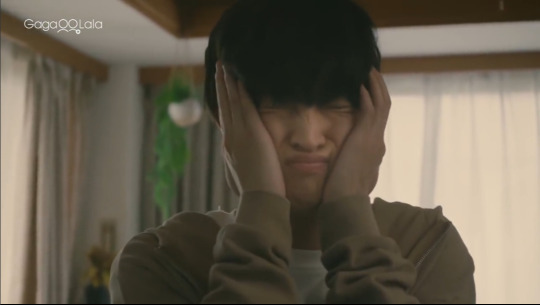
If you're wondering why Yoh's freaking out about the rainy season even though they've been together for 3 years, the manga artist posted a clarification on twitter:
By the way, “it’s been 3 years since then” – that phrase refers to it being 3 years since that conversation regarding the slave contract. As for living together, they’ve only just started (to do so) around Mar/April*, so (at this point) it’s only been a few months (for them). What if (I) got it wrong…. I remember making a note of it, but the file that I wrote it in and passed over (to the crew) couldn’t be found right, so… (was it) a dream?” *Japan's rainy season comes around June/July, so this means that this is the first rainy season these two have been experienced together.
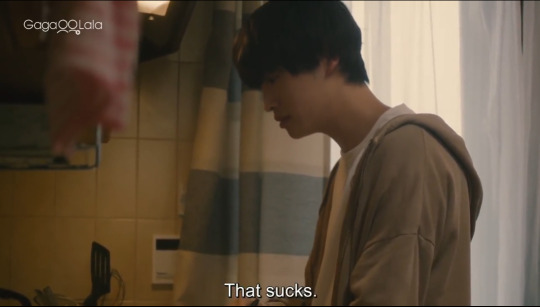
[Y: まずっ] Y: Tastes bad In case the original "that sucks" sounds like Yoh might be talking about the news of the young forecaster - he's really just talking about the food here.
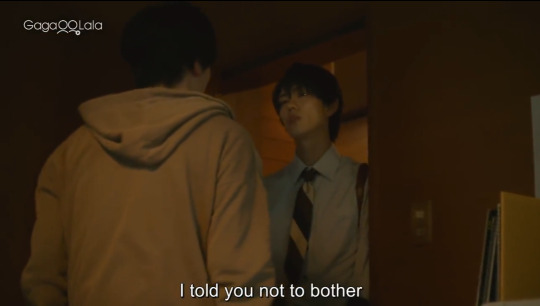
[S: 遅くなるからいらねぇっつっただろう] Original: I told you not to bother since I returned late Mine: I told you I wouldn't need it cause I'd be late right? This is actually a pretty harsh sounding line tbh. It's sort of inkeeping with Segasaki's curtness, but still pretty harsh - so this tells us he's tired after a long day, and explains the frown on his face that Yoh just wipes away with his cuteness

Nikujaga literally means meat and potatoes. It's a stewed dish and a very well-loved comfort food. Super easy to make too (link goes to an easy to follow recipe, and the site also explains a little about the dish).
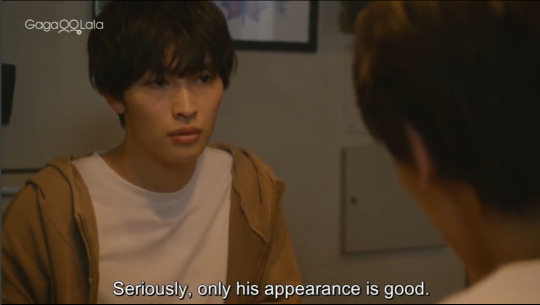
[Y: 本当、顔だけはいいよな] Y: Really, it's only his face that looks good.

I've talked about this in my cultural/language tidbits for this episode (linked up top) but I'll add it here for completion's sake
[Y: あ、いや。なんでもない…です*] (Ah, iya, nandemonai…desu*) Y: Ah, no, it's….nothing* Yoh let's his sentence trail off before tacking on a "desu" at the end. "Desu" is an ending verb characteristic of "polite" speech, which Yoh doesn't use frequently with Segasaki (in fact, by this point, he has not used polite speech with Segasaki at all, except for maybe saying the full form of the word "welcome home", and even that's pushing it). Here he adds it at the end as an afterthought (the polite form of "iya" would be "iie", if he had wanted the whole sentence to be polite from the get go), which tells us that Yoh's feeling a little off-kilter here, and does introduce the slightest distance between him and Segasaki. We'll see this distance increase as the episode goes on.

[Y: いや、どう考えても食べ過ぎだろう] Y: No but, no matter which way you look at it, (he's) eaten way too much hasn't he? Btw, if your hair started standing at the spoon scraping the pot - in the manga artist's post about visiting the shooting venue (as well as during Ep 1 twitter space) it was mentioned that Mashiko, the actor, can actually cook, so during filming they had to tell him what someone who can't would likely do, and also asked him to do the housework poorly (because Yoh's not supposed to be good at cooking or housework hahaha)
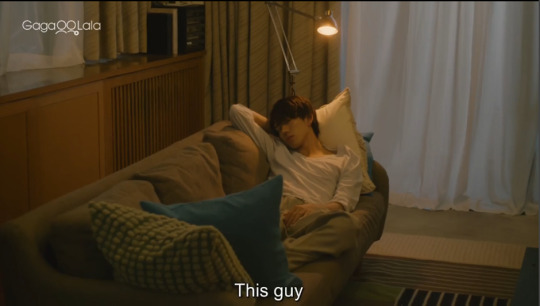
この人*、明日も朝早いんだよな。たぶん。 Original: This guy, has an early morning again tomorrow. Probably. Mine: This person*, has (to leave) early tomorrow morning too. Probably. *The word here is "kono hito", literally "this person". There's actually nothing wrong with the translation "this guy" tbh because that's a fairly neutral term in English, but I'm highlighting it here because in his monologues, Yoh usually refers to Segasaki using much rougher language, such as "koitsu, aitsu", except when he addresses Segasaki directly in his head. I'll talk more about how Yoh addresses Segasaki in the analysis post, but for now - this sentence hints that Yoh has clocked Segasaki's tiredness (subconsciously or not) and is feeling a little bad for him. Then again he quickly hides that by adding on "probably". (Adding the word "probably" behind your sentence is a common way to express doubt/negate what you just said, and incidentally is commonly used by comedians to deliver a punchline).
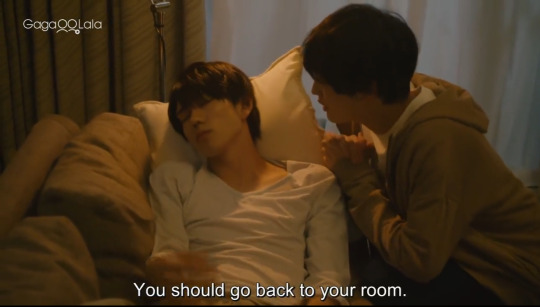
[Y: あの*…あの…寝るなら部屋でとおもって。] Original: Um… Hey… You should go back to your room. Mine: Um*... Um... if you're going to sleep then, (it would be better to sleep) in your room - at least that's what I thought...
*"あの…" (ano…), translated as "um" here, is a common sound you use when you want to get someone's attention but don't want to sound too demanding - it actually isn't being polite per se, but it does show the hesitancy with which Yoh approaches him. Contrast this with the way Segasaki gets Yoh's attention (so far it's just been "Yoh" or "Oi" - the latter of which you would NOT use unless you were close to the person, or looking for a fight).
As a general rule of thumb, the level of politeness in Japanese is directly correlated with the length of the sentence and just how far you can beat around the bush. So, Yoh's suggestion that Segasaki goes to sleep in his room is literally just "if sleeping, then room..." and everything else in that translation is assumed. He may not being using polite speech forms here (that would be "to omoimashita" instead of "to omotte") but this is still a common way to be polite because he's making a suggestion that is so mild Segasaki can choose to ignore it. This is a great example of Brown & Levinson's "negative politeness" which we'll revisit when analysing their speech patterns, and which you can read about in entirely too much detail here (free to read).
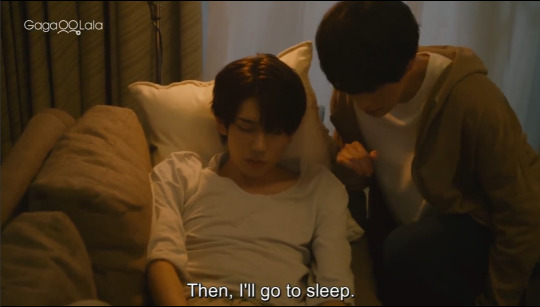
[Y: じゅあ、俺は寝るので** あの、その、そういうことで、おやすみ] Original: Then, I’ll go to sleep. That…sort of thing. Good night. Mine: So then, I'm going to bed, therefore**... Um... that... with that... night!
"Therefore" is an awkward translation for the word ので (node), which is more often translated as "so". I've chosen to use that word because "node", whilst again not a polite form per se, is less colloquial than the more commonly used "から(kara)", to mean the same thing. It tends to pop up more in writing than in speech. "Therefore" doesn't make a sentence polite/formal in English, but it's definitely less colloquial than using the word "so". The use of "node" is just that tiny bit out of place in this sentence paired with the informal pronoun "ore" for "I" as opposed to the more formal choice of "boku".

Again, Yoh answers Segasaki properly here with a "はい (hai)" as opposed to his usual "un" (which is a sound that expresses agreement), when told that Segasaki will be late again. There actually aren't very many moments where Yoh does speak politely to Segasaki (he's definitely rude when he talks about Segasaki in his head hahaha), so these moments stand out. This whole short exchange, together with the random -desu he added earlier, just make Yoh's sentences a little more stilted/awkward, and more distant. Individually they don't deserve much mention at all, but together, and in the context of his jealousy, show just how unsure Yoh is about where he stands with Segasaki.
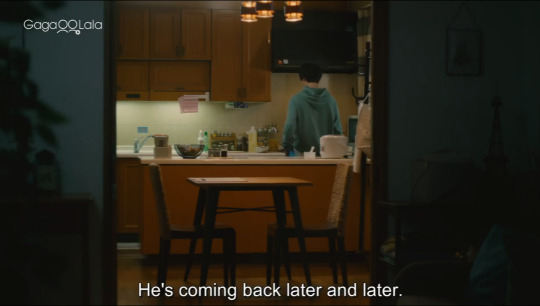
[Y: あの人の帰宅が遅くなり] Y: That person returned home later and later
"That person" - similar to the above usage of "this person". This sentence is incomplete - the verb form of the last word - 遅くなり (osokunari) indicates that there should be a second part to the sentence (the "completed" form would be osokunatta). But after he says this, there is a pregnant pause, as Yoh puts his phone down and continues cooking alone. The pause continues all the way into the next scene, before the sentence continues, highlighting the loneliness that Yoh feels.

[Y: 当然、触れられることもないままに] Original: Of course, he did not touch me at all Mine: (and) of course, (I) remained untouched (by him) as well
The literal translation for this would be "(the situation in which I) was not touched (by him) continued on as well". Yoh uses the passive form of the word "touch", which places the emphasis on Yoh "receiving" the action of being touched as opposed to placing the emphasis on Segasaki "carrying out" the action of touching Yoh. Consider the difference between the sentences "I was hurt by him" and "he hurt me". The former is the passive form, and is super common in Jp, much less common in Eng. If this is confusing - welcome to Jp grammar just know that the emphasis of this line is more on what Yoh does not have, rather than what Segasaki has not done. It accentuates Yoh's feelings of emptiness and loss.
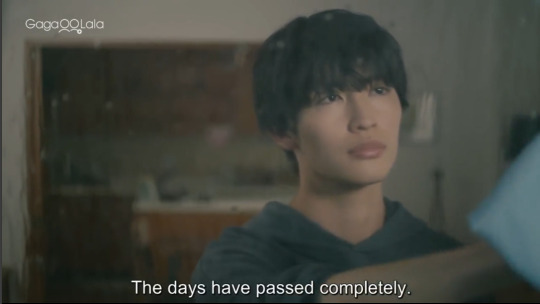
Y: すっかり日々は過ぎて Y: The days pass by completely ...
Similarly, this sentence is "incomplete", and is instead continued by Segasaki walking in and telling Yoh he'll be late again. (This whole bit just hurts my soul tbh, Yoh is so lonely. )
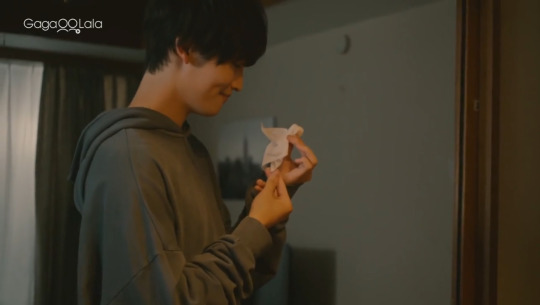
This is a teruteru bouzu aka a charm of sorts for good weather. See the cultural tidbits post for Ep 2 linked up top for more info!

This is said really strongly, and gives the "what the hell are you doing" feel. Yoh's truly upset here.

I try not to care about some of the subs in these side conversations because they don't add much to the main story and these posts are already too long, but this sentence should really be "Dammit, maybe I should (go) troll the chat" (and the previous sentence should be "If this was broadcasted in a certain country it would be instant death" aka N.Korea ^^;) and I just think it was a nice touch to hint at the fandom wars/flaming that goes on between fans hahaha
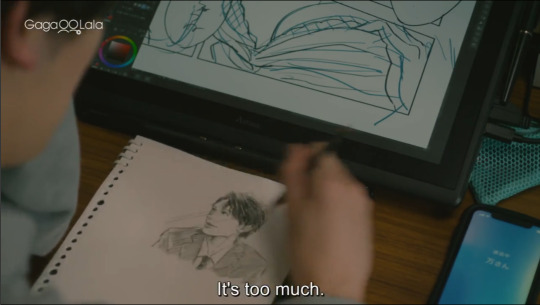
[Y: しんどい] Y: This is too draining The word here used is "shindoi", which is a term used when you're feeling mentally/physically exhausted/drained, and carries a sense of frustration (at feeling this way) and sometimes (emotional) pain.
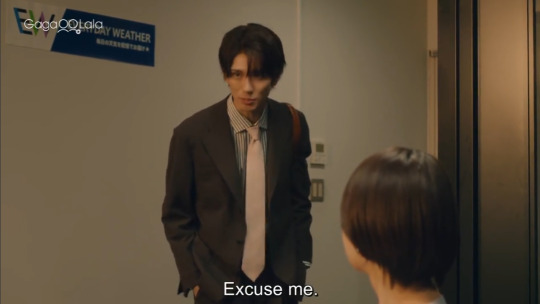
This. Is. Huge. Segasaki does 2 things here - one, he rejects an after-work meal, which you rarely do because Japan is all about the group and rejecting a group invite, to welcome a new member, can make you seem like you aren't a team player - two, the guy who invites him is his senior, which you can tell because Segasaki sticks to polite speech forms whilst the other guy does not. It's still relatively casual, so you can tell he's got a good working relationship with them (probably why he's not worried about rejecting them) but still. In Segasaki's world, Yoh is the No. 1 priority.
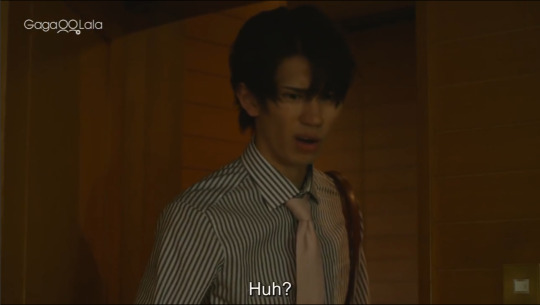
This is more accurately "WTF". There are many sounds in Japanese that aren't exactly words, but carry a lot of meaning - "Haa?!" is one of them, and is a very rude way to express a lot of anger and shock. Please, never say this in real life. You will royally piss off whoever it's directed at and if you are outside a Shibuya bar you will get punched.
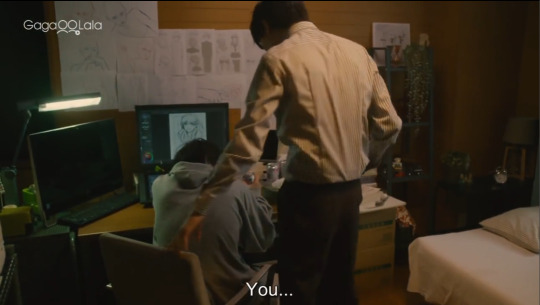
The word used here is てめぇ (temee), which is a really rude way to say "you", and has the same energy as "you bastard". Segasaki usually uses the informal pronoun "omae" for "you" when he talks to Yoh, he's definitely pissed off here.

This is the same word, "shindoi" again.
I'm going to put the rest of the whole argument here with just my translation because it's too long to screencap the whole thing.
[S: 何なんだよ?このエロい惨状は Y: うるさい。 Y: 俺は売れっ子エロ漫画家になるんだ S: なんだそりゃ。おい *takes away beer can* Y: 売れっ子さんが シコリながらネーム描くと いいのができるって言ってた S: なんも描けてなかったぞ。 S: おい、だめだっつってんの S: 飲みすぎ 出すもん出して 寝てただけだろう Y: 黙れ! Y: 俺はエロくて 抜ける漫画描いて いっぱい稼いで Y: 早く こんなとこ出ていくんだ S: はあ? おい、お前 どういうつもりだよ Y: どうもこうもないよ! Y: 平気で抱かれてると思うなよ 。 Y: 俺のこと、好きでもないくせに Y: 便利な奴隷としか思ってないんだろう?そんなにやりたきゃ隣のキャスターとやってろよ S: お前 さっきから 何を... Y: 俺はあんな風に笑いかけられたことない]
Breakdown: S: What's up with this? This lewd disaster of a scene Y: (You're) annoying! ["うるさい (urusai)" is often translated as "shut up", but it literally means someone is being "noisy", and here is more of a complaint that Segasaki is being bothersome] Y: I'm going to become a hot-selling erotica manga artist! [the word used here is 売れっ子 (urekko), which literally means "someone who gets huge sales" and mostly refers to idols, entertainers, TV personalities etc. So Yoh is not just saying he's going to become popular, he's saying he's gonna be like a celebrity manga artist, which is why Segasaki snorts a little at this] S: What's with that? Hey. *takes away beer can* Y: The hot sellers say that if you jerk off whilst drawing your storyboard, you'll come up with good stuff [urekko-san is a pretty cute way of referring to these popular artists] S: You've not drawn anything, you know? [this is said with a really indulgent air, which contrasts directly with the more authoritative tone of the next line] S: Hey, I'm telling you no more *grabs beer can* S: You drank too much. You just shot what you shot and then went to sleep didn't you? [And this is back to an indulgent tone - also, everyone knows Segasaki is talking about cumming here, he just doesn't actually say it so directly] Y: Shut up! ["黙れ (damare) - contrast with "urusai" earlier. The former is used much less commonly and really does mean to "be quiet". This is why Segasaki pauses and looks at Yoh. Up until now Segasaki just thinks Yoh's gotten drunk and is whining cutely, but this word means things are serious.] Y: I'm going to draw manga that is erotic, that you can wank off to, and then earn lots of money [this is a call back to the conversation with Man-san over the phone in Ep 1, which I did not include earlier because I didn't think it was important to the story when Yoh says "the work that was released last month was amazing! There was a big buzz around the topic "I can't wank off (to this)" - Yoh was being sarcastic here, meaning that he got reviews that his work wasn't erotic enough] Y: and leave this sort of place soon! S: What? Hey - what (the hell) are you thinking? [Again, "haa?" here shows he does NOT like what Yoh's saying, but he does soften the end of the sentence with a "yo"] Y: I'm not thinking of anything! Y: Embracing me so easily - don't think you can (keep on) doing that [again, this is the passive form, so the emphasis is on Yoh being embraced, and here has the nuance of "don't think I'll just (keep on) being fine with being embraced (by you) like it's some sort of norm"] Y: when you don't even like me [this line has quite a bit of bitterness in it - the emphasis here is strongly on Segasaki and his apparent "non-liking" of Yoh my english is dying.] Y: You think of me as just a convenient slave, don't you? Y: If you want to do it that much, go do it with that forecaster next to you! S: You... from the start... what have (you been saying?) Y: I have never been smiled at like that before [again, this is in passive voice]
It's obvious from the acting alone that this entire argument is pretty emotionally charged - this is also reflected in the language because Yoh uses the pronoun "ore (I)" a lot. Pronouns are frequently dropped in Japanese - often you can go an entire conversation without ever uttering the words "I/me" or "you", in part because the pronouns are assumed and also because emphasis on an individual can come across as too selfish/narcissistic or direct. Segasaki uses them often enough with Yoh, which fits his personality, but Yoh normally doesn't. So, when he uses "ore" here it stands out - his plans to be successful and leave, his feelings, his interpretation of Segasaki's actions - all of the emphasis is on his own self. The message is very clear - Yoh is hurting a lot more than he is blaming or accusing Segasaki.
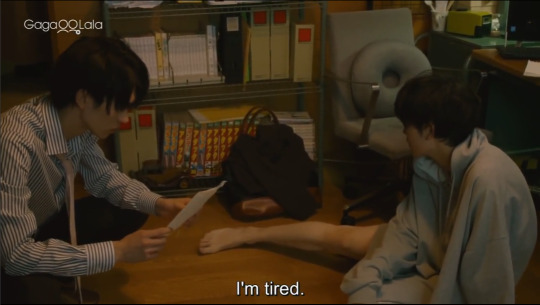
[Y: もう疲れた。あんたといると疲れる。嫌いだ S: お前 酒入るとめちゃくちゃしゃべるんだな Y: ねぇ、何で雨の時はだめなの? S: はあ? だって、お前が言ったんだろう] Y: (I'm) tired out. When (I'm) with you, (I) get tired. Hate it. [We've lost the "I" pronouns here, because the emphasis is on the extreme sense of physical and emotional fatigue as opposed to Yoh himself, and on how much he dislikes that feeling. Of note, "hate" here is closer to "detest/really dislike" - the word is "kirai" - which is not as strong as the word "nikui" which we talked about in Ep 1 when Yoh said he hated the part of him that always listened to Segasaki. Also, this is the first time Yoh has addressed Segasaki with the pronoun "you" out loud - he uses "あんた anta", which he also used in his head in Ep 1, after they did it. Again, we'll talk about this in the analysis post in the future, but for now just know that this term is usually used between older couples.] S: You... once you start drinking you really start talking huh? [literally, you "become able to talk"] Y: Hey...why is it when it rains, (we) can't do it? S: What? Because, you said so didn't you? [the last "haa?" from Segasaki! This time expressing his surprise and slight indignation.]
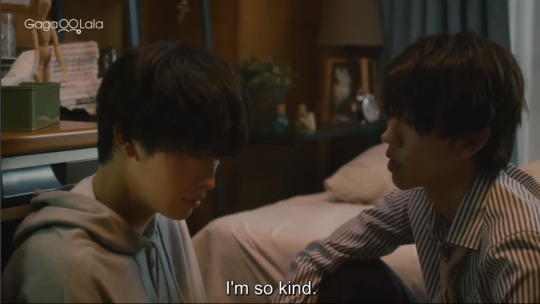
[S: 俺は優しいんだ] S: I. am. Kind. Great example of Segasaki's use of the "ore" pronoun here to quite literally emphasise how great he is. "優しい (kind)" in Japanese carries the connotation of being thoughtful, anticipating the other person's needs and wants and then meeting them etc. It's a characteristic that people often say they look for in their potential partners.
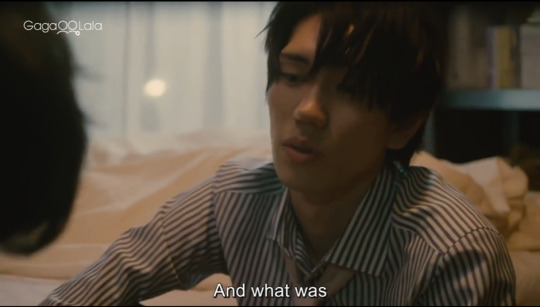
[S: そもそも、なんだ先の言いぐさは 好きじゃないだの 出ていきたいだの お前 俺のプロポーズを受けといてよくそんなことが言えんな S: 養ってやる*っつってんだ プロポーズ以外になに] S: In the first place, what was with those things you said earlier? That you don't like me, that you want to leave... You... that was rich, saying all that after accepting my proposal. S: I was saying I'd provide and care* for you. If that's not a proposal than what is? ["養ってやる" is a pretty possessive way to say I'll provide for you - it's the same word used when referring to parent providing for a child, or an owner providing for a small animal. It's not rude per se, but it does imply a power imbalance. Segasaki actually sort of has a point here because... this is not something you say to someone else unless you're in a relationship ^^;]

S: ていうかお前、俺のこと嫌いなんだ S: どうなの S: Actually about that... so you hate me huh? S: Which is it?
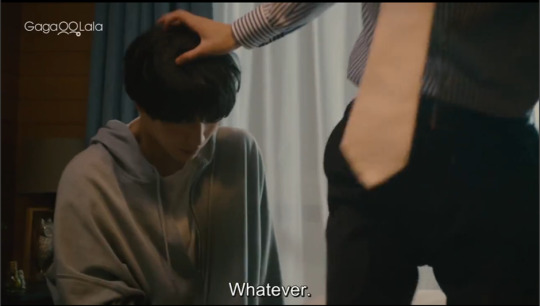
S: ふーん。あ、そ S: Ohh..? I see. ふーん (Ohh..?) - Segasaki says this a lot, especially in this episode. This is another one of those sounds that isn't a word but carries a lot of meaning. It has a dismissive sort of tone to it, like you've already assumed something or when you're pretty nonchalant/not impressed about whatever the other person has said and are just playing along with them by giving them some attention (so again, if you use it wrongly, it can piss people off). Segasaki uses it whenever Yoh goes mute or shy, as a way to tease Yoh - though Yoh seems to think Segasaki is dismissing/not interested in his answer. あ、そ (A, so) - again, Segasaki says this a lot - can be interpreted as "oh really?/I see/is that so?" - Combined with the above, you can see why Yoh often thinks Segasaki isn't interested in his answer, and even when he does recognise it as teasing, he gets too flustered to do anything about it.
This seems to have gotten longer, if you reached the end - congratulations! I hope this makes it a little clearer why it's so obvious to us as the viewer that Segasaki is really quite patient with Yoh, and is waiting for him to come to terms with his feelings, but at the same time so confusing for Yoh, because of the way many of these interactions can be read both ways. In Ep 3, we'll really be able to get into their dynamics because they've got so much more interaction together.
#my personal weatherman#taikan yohou#体感予報#MPW subtitle corrections#mytranslations#finally got it out#doing a breakdown of the argument was very fun#this is like the most indulgent t/n ever#i am indulging myself the same way segasaki indulges yoh#thanks to everyone for reading my indulgent notes#please geek out with me more#these two are so perfect for each other#sorry I wanted to get Ep 3 and the analysis out before Ep 4 but it's not happening
205 notes
·
View notes
Text
Fun fact: The name of every main character in grand maison Tokyo contains the name of a type of food or seasoning.
尾花夏樹 (おばな なつき)
ばなな:banana
早見倫子(はやみ りんこ)
みりん: mirin
平古祥平(ひらこ しょうへい)
こしょう: pepper
芹田公一(せりた こういち)
せり: celery
たこ: octopus
蛯名美優(えびな みゆう)
えび: prawn
松井萌繪(まつい もえ)
いも: potato
峰岸剛志(みねぎし つよし)
ねぎ: scallion
柿谷光(かきたに ひかる)
かき: persimmon/oyster
丹後学(たんご まなぶ)
ご ま: sesame
リンダ・真理子・リシャール (りんだ・まちこ・りしゃーる)
ちこり: chicory
久住琹奈(くずみ かんな)
みかん: orange
江藤不三男(えとう ふみお)
とうふ: tofu
相沢瓶人(あいざわ かめひと)
わかめ: seaweed
京野陸太郎(きょうの りくたろう)
のり: another type of seaweed, dried and edible, often used for wrapping sushi
Some of these are quite obvious like 芹田, 蛯名, and 柿谷 which already have food-related kanjis in them. And some of them are kinda reflective of these characters’ personalities. Banana in natsuki’s name is so cute, yellow one the outside and white on the inside. Mirin, the quintessential Japanese seasoning is symbolic of rinko’s cooking style, incorporating traditional Japanese ingredients into French cuisine. It’s no coincidence that both names of aizawa and kyono, who used to work with obana back in Paris, contain a type of seaweed. The versatility of wakame is representative of aizawa’s talent for paring ingredients. Nori, on the other hand, is very dry like kyono, difficult to eat it alone. Kyono is like nori in that he always needs partners.
#takuya kimura#木村拓哉#La grande maison Tokyo#グランメゾン東京#kyoka suzuki#鈴木京香#it just makes me wondering if the screenwriter came up with the food names first and then characters names or the other way around#editing this post was very exhausting as I had to switch between keyboards and I had around a dozen of keyboards on my phone😵
33 notes
·
View notes
Text



みんな、こんにちは!
今日は何をしましたか?友達とレストランで美味しいブランチを食べて、タピ活をしました。
オムレットの中でハムとソーセージとキノコとタマネギとチーズがありました。すごく美味しかったです!肉は美味しいですが、野菜も食べるのが大切でしょう?
いちごミルク味とタ��味が好きですが、今回イチゴのを選りました。とてもおいしかったです!
今週の晩ご飯は生姜焼きです!生姜のソースを作るは簡単です。ソースの材料は:
醤油 (しょうゆ) - soy sauce
味醂 (みりん) - mirin
砂糖 (さとう) - sugar
料理酒 (りょうりしゅ) - cooking sake
おろしたて生姜と玉ねぎ- freshly grated (おろしたて) ginger (しょうが) and onion (たまねぎ)
最近、私の勉強は快調です。ようやく漢字を思い出して、書くもができます!嬉しいです!(*^▽^*)
先週の漢字:
草 (grass) 🌱 - Grass/plant radical + early/fast = Grass is the fastest growing plant.
林 (grove)🌲 - Tree + tree = Two trees make up a grove.
森 (forest) 🌳🌳 - Tree + tree + tree = Three trees make up a forest.
交 (mix, mingle) 🥣 - Pot lid radical + Father = The Pot Lid Dad Society (dads wearing pot lid hats) have a mixer every 6 (六) months.
校 (school) 🏫 - Tree + Mingle = The Pot Lid Dad Society has their mixers/meetings outside the school.
言 (word) ✏️ - Lines + Mouth = You use your mouth to say lines of words.
語 (language) ✍️ - Word + 5 + Mouth = Language is produced by many mouths.
話 (story, to talk) 🗣️ - Word + Tongue (or Thousand + Mouth) = A story is passed down from one person to the next until a thousand mouths can repeat it.
売 (to sell) 🎁 - Samurai + Hat + Human Legs = A jobless samurai walks door-to-door to sell hats.
読 (to read) 📖 - Word + Sell = Extra, extra! Read all about it! (The newspaper "sells words.")
本 (book, origin) 📕 - A book is the root/origin of knowledge, made from trees (木).
#japanese#japanese language#langblr#japaneseblr#japanese langblr#jpnlangblrnet#日本語#勉強#日記#ダイアリー#料理#食べ物
12 notes
·
View notes
Text
Lotus root hamburger steak (prose, cooking)

Dish

cutting
The lotus root is a sacred plant. It is edible in Japan. It is a bit hard when cooked as is, so at home, I make hamburger steaks. Mix finely chopped 200g lotus root with salt and thyme, also chop 1/2 an onion and add it. Knead it with flour, and shape it into a hamburger steak. Allocate plenty of water, The moisture content should be about the same as that of okonomiyaki. if you knead it too hard it will become hard. Fry in a frying pan with olive oil. It has a chewy texture and is delicious. It is a vegetarian dish that does not use any meat.
2024.11.26
蓮根のハンバーグ (prose, cooking)
聖なる植物蓮根。日本では食用にする。そのまま調理すると少々硬いので、我が家ではハンバーグにする。細切れにした200gの蓮根に、塩、タイムを混ぜ、玉ねぎ1/2もみじん切りにして加える。小麦粉と練り合わせて成形する。水を多めに配分し、「お好み焼き」くらいの水分量に。あまりつよく捏ねると硬くなる。フライパンにオリーブオイルを敷いて焼く。もちもちした食感で美味しい。肉を一切使わない、ヴェジタリアン向きの料理。
7 notes
·
View notes
Text
Members of society in Japanese
A simple bilingual vocabulary list for words related to society.
Lista słówek: członkowie społeczeństwa w języku japońskim
赤ちゃん (あかちゃん) = baby; infant; niemowle; dziecko
お腹がすいたら、赤ちゃんは泣く。 When babies are hungry, they cry. Kiedy dzieci są głodne, to płaczą.
男 (おとこ) = man; mężczyzna
女 (おんな) = woman; kobieta
男 and 女 are casual forms 男の人 and 女の人 are formal/regular forms 男性 and 女性 are more formal and 'adult-like'
仕事好きな女の人もいるし、料理や洗濯が好きな男の人もいる。There are women who like working, and there are men who like cooking and doing the laundry. Są kobiety, które lubią pracować i są mężczyźni, którzy lubią gotować i prać.
王(おう) = king; król
王様(おうさま) (sonkeigo; honorifics)
彼らは王の殺害をたくらんでいる They are plotting to kill the king. Knują spisek, by zabić króla.
企む (たくらむ) = to plan; to scheme; to plot; knuć
殺害 (さつがい) = [noun] killing; murder; morderstwo
女王 (じょおう) = queen; królowa
王妃(おうひ) = empress; wife of a king; cesarzowa; żona króla
エリザベス女王2世 Queen Elizabeth II Królowa Elżbieta II
女王が国を支配する A queen rules a country. Królowa rządzi krajem.
支配(しはい) = [suru verb] rule; domination; rządzić
大統領 (だいとうりょう) = president (of a nation); prezydent kraju
大統領が重要な決定を下す The president makes important decisions. Prezydent podejmuje kluczowe decyzje.
重要 (じゅうよう) = [na-adj] important; ważny
決定を下す (けっていをくだす) = to make a decision; podejmować decyzję
隣人 (りんじん) = neighbor (document level formal); sąsiad
お隣さん (おとなりさん) = neighbor (everyday use)
近所さん(きんじょさん) = neighbor (formal)
だってお隣さんだし。ちょくちょくお邪魔するから。 Well, we’re neighbors. I’ll be popping over all the time. Jesteśmy sąsiadami. Będę wpadał cały czas.
お邪魔 (おじゃま) = [suru verb] hindrance; obstacle; to visit someone’s home; odwiedzać kogoś; przeszkoda
ちょくちょく = often, frequently; często
お隣さん is strictly neighbors on your right/left. 隣人 covers a circular area of effect, including nearest neighbors in all directions, in its meaning. 近所’s area of effect stretches more than the other two, is not limited to the nearest neighbors, and can include ones next to them.
女の子 (おんなこ) = girl; chłopiec
男の子 (おとここ) = boy; dziewczynka
女子 (じょし) = girl
少女 (しょうじょ) = young girl
少��� (しょうねん) = young boy
Awesome article related: https://www.japantimes.co.jp/life/2008/08/12/language/it-aint-too-bad-being-a-joshi-or-a-danshi/
子供(こども)= child; dziecko
子供のときに When I was a child... Kiedy byłem dzieckiem...
大人 (おとな) = adult; dorosły
成人 (せいじん) = adult; dorosły
成人 is a legal term and a person referred to as 成人 is over 20.
On a daily basis 大人 is used.
成人教育 Adult education Edukacja dorosłych
教育 (きょういく) = education; edukacja
人間 (にんげん) = human (≠ animal); człowiek
あの人は人間嫌いですか? Does that person hate people? Czy ta osoba nienawidzi ludzi?
人間嫌い (にんげんぎら) = misanthropy; misanthropist; mizantrop
友達(ともだち) = friend
Extra words: nakama | なかま | 仲間 “friend” (common in anime but uncommon in real life) shin'yuu | しんゆう | 親友 “close/best friend” tsure | つれ | 連れ “partner” (probably not in a romantic or sexual way) aibou | あいぼう| 相棒 “partner” (of a duo) shiriai | しりあい | 知り合い “acquaintance” chijin | ちじん | 知人 “acquaintance” doukyuusei | どうきゅうせい | 同級生 “classmate” douryou | どうりょう| 同僚 “colleague” dachi | ダチ “buddy” (slang way of saying friend) mabudachi | マブダチ “best bud” (slang way of saying close/best friend) yuujin | ゆうじん | 友人 “friend” (formal) kyuuchi | きゅうち | 旧知 “long[time] acquaintance” (source: quora)
7 notes
·
View notes
Quote
日本語では一つの名前で表されるのに英語だと二種類以上あるもの
[B! 増田] 日本語では一つの名前で表されるのに英語だと二種類以上あるもの
たとえばつぎのようなもの、というお題。
亀 - Turtle (海亀)、tortoise (陸亀) ワニ - Alligator, Crocodile
- - - - - - - - - - - - - - - -
はてなブックマークがトリビアの披露大会になっていて、知識が集まってる。 逆パターンも 「英語では一つの名前で表されるのに日本語だと二種類以上あるもの」
- - - - - - - - - - - - - - - -
日本語では一つの名前で表されるのに英語だと二種類以上あるもの
聞く:hear, listen 見る:see, look, watch 海:sea, ocean, waters, marine(海の) 仮説:hypothesis, assumption 罪:crime, sin (「罪と罰」の罪は以外なことにcrimeのほう *)
英語では一つの名前で表されるのに日本語だと二種類以上あるもの
Museum:美術館、博物館 Requirement:要件、要求 Space:空間、宇宙
- - - - - - - - - - - - - - - -
「総称だけ存在して、細かな違いを呼び分けない」ものと、「総称は無いが、個々の細かな呼び分けだけある」ものに分けられるかも。 総称:亀 / 個々に:Turtle (海亀)、tortoise (陸亀) 総称:皿 / 個々に:dish、plate、saucer 総称:brother / 個々に:兄、弟
- - - - - - - - - - - - - - - -
秋のAutumnとFallのパターンは、意味もニュアンスも同じで、言い方が違うだけかな。 Fallが「秋」「落下」の2つの意味。
- - - - - - - - - - - - - - - -
仕事(taskとworkとjob)
槍:スピア、ランス、ジャベリン、トライデント。/悪魔:デビル、デーモン
managementもadministrationも(場合によってはcontrolも)「管理」、featureもfunctionalityも「機能」
一番有名なのはネズミ(mouse, rat)だと思ってた。他にもphantom/ghost、coast/beach、house/home、college/university、space/universe、earth/globeとか。厳密には意味が違うんだろうけど。
カラスのravenとcrow。
好き(loveとlike)/時計(clockとwatch)/サイン(sign、signatureとautograph)
言語とその話者の世界観が相関することは言語的相対論と呼ばれる。国がcountry, nation, stateに分かれるのは島国と多民族大陸国との違い。https://gijodai.jp/library/file/kiyo2011/yoshitaka_sato.pdf
ApeとMonkey
AlligatorとCrocodileの違いは、口を閉じたときに下の歯が見えるかだって伊豆で習った。
ちょっと違うが、"将来に対する希望"と、"睡眠中の幻覚体験"を日本語でも英語でも「夢 dream」という一語で表現するのは全くもってピンと来ない。
麦は日本語でも大麦・小麦・ライ麦・エン麦は区別はしてるけど、英語ではbarley wheat rye oatで「麦」に対応する単語がないのよね
アプリ開発で Apple の審査担当とやり取りする際「修正」の言い方が複数あって fix, correct, modify, revise, alter などを使い分けてくるので毎回意図を汲みとれてるか不安になる。(まあ日本語にも修正の類語いっぱいあるけど)
「毒」 poison / venom / toxin
romanceとnovel。romanceは通常騎士道物語など物語と訳されるのだけど、小説と訳されているときもある。
CollegeとUniversity
試験: 学力・知識を問う→examination,quiz,test 評価や実験→experiment 試みる→trial▼ただ「試験」で纏められるだけで日本語でも「考査」「実験」「試行」と分けて書くこともできるが。
自由(Liberty,Freedom)。契約などの法律上のやり取りが単語を増やした気もする。
紫→purple,violet
夫、旦那、亭主、主人→husband
足の指(toe)もfinger じゃない
日本語において、髭は全て「髭」で、生えてる箇所を限定する場合は「顎髭」や「頬髭」などと熟語で表現するが、英語ではそれぞれの箇所に単語がある。
リス:squirrel、chipmunk
馬車がとてもややこしくて面倒くさい / 辻馬車 cab, hansom 荷馬車 (horse)cart, wagon, (horse-drawn)carriage, horse and buggy 駅馬車 stagecoach 二輪馬車 curricle, tilbury ,jaunting car ,jinker 馬二輪戦車 chariot まだまだいっぱい…
今話題のsexとgender
政治家 politician / statesman たまご egg / spawn / roe ちなみに逆もあってegg 卵 / 玉子
この手の単語なら調理法が多い。アメリカは焼く文化だ。肉、パン、物で違う(Grill、Bread、Burn、BBQなんてのも)一方で日本は煮る文化だ。煮る、茹でる、炊く、煮込む。英語はBoil、あるいは残り全てはCookだ。
おじさんとおばさん、日本語でもこだわりがある場合には年上か年下で漢字が違うらしい。中国語では母方と父方で別の名前になる。
- - - - - - - - - - - - - - - -
知里真志保によれば、大和民族が川の始まりと考える「みなもと(源)」をアイヌ語では「川の終り」と言うのだという。つまりアイヌは川を海の方から見ているのだと。
コメントで日本語は部位に依らず「髭」だけってあるけど、いちおう漢字だと「髭(くちひげ)」と「鬚(あごひげ)」と「髯(ほおひげ)」で使い分けられる。発音はぜんぶ「ヒゲ」だけど……
- - - - - - - - - - - - - - - -
言語学で言うところの有標と無標も関係してそう。 作家:男女問わ��作家の全般、女流作家:作家の中で女性の場合
標識 (言語学) - Wikipedia
英語のlionは雄雌どちらのライオンも表すが、lionessは雌だけである。前者が無標で後者が有標である。
133 notes
·
View notes
Text
Translating the Human Side introductions for Witch's Heart, because I've always wanted to know what they said. If someone else has translated these without DeepL, please let me know.
[ translated with DeepL. ] [ localized by me. ] [ DeepLで翻訳 ] [ ローカライズ ]
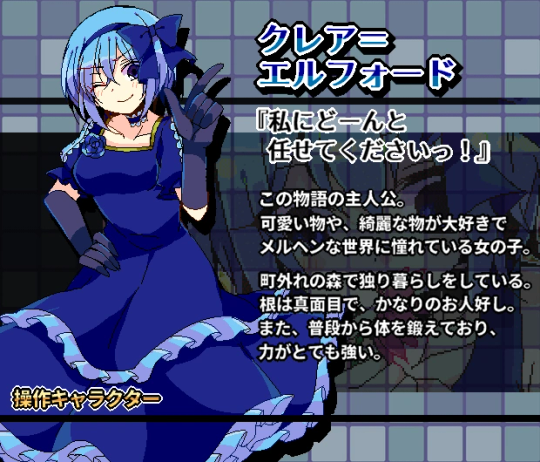
Claire Elford
"I'll take care of it!"
The main character of this story.
She loves pretty and beautiful things,
and longs to live in a fairy tale world.
She lives alone in the forest on the outskirts of town.
She is earnest at heart and quite good-natured.
She also works out on a regular basis and is extremely strong.
and I'll include the Japanese text as well, because there's no reason not to. The golden text [ 操作キャラクター ] is just [ character ].
クレア
エルフォード
『私にどーんと
任せてくださいっ!』
この物語の主人公。
可愛い物や、綺麗な物が大好きで
メルヘンな世界に憧れている女の子。
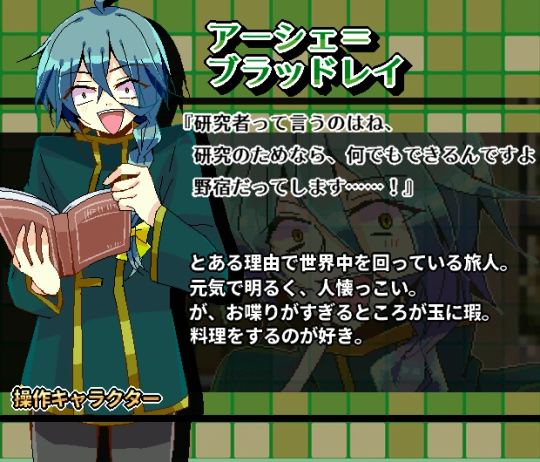
町外れの森で独り暮らしをしている。
根は真面目で、かなりのお人好し。
■また、普段から体を鍛えており、
力がとても強い。
Ashe Bradley
"You know what they say about researchers.
I can do anything for the sake of research.
I can even camp in the wild…………….!"
A man who travels around the world for one reason or another.
He is energetic, cheerful, and friendly.
However, he is a bit too talkative.
He likes to cook.
アーシェ
ブラッドレイ
『研究者って言うのはね、
研究のためなら、何でもできるんですよ
野宿だってします……………!』
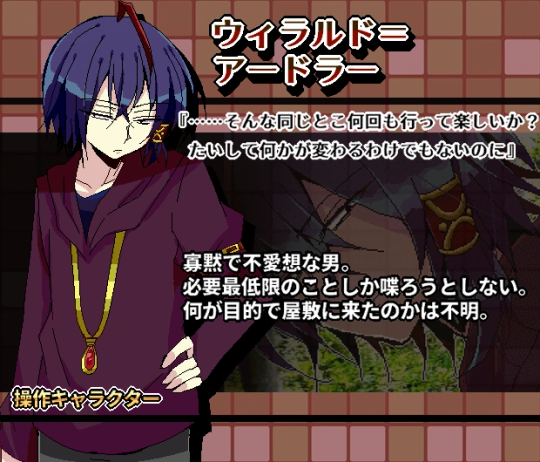
とある理由で世界中を回っている旅人。
元気で明るく、人懐っこい。
が、お喋りがすぎるところが玉に瑕。
料理をするのが好き。
Wilardo Adler
"How much fun is it to go to the same place over and over again?
It doesn't change."
A taciturn, unsociable man.
He only speaks the bare minimum.
It is unclear why he came to the mansion.
ウィラルド
アードラー
そんな同じとこ何回も行って楽しいか?
たいして何かが変わるわけでもないのに』
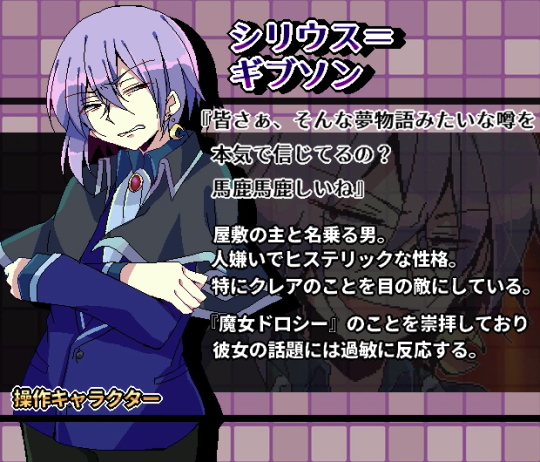
寡黙で不愛想な男。
必要最低限のことしか喋ろうとしない。
何が目的で屋敷に来たのかは不明。
Sirius Gibson
"Do you people really believe those fantastical rumors?
They're absolutely ridiculous."
A man who claims to be the owner of the mansion.
He is misanthropic and hysterical.
He is especially hostile to Claire.
He reveres "The Witch Dorothy",
and is sensitive to any mention of her.
シリウス
ギブソン
『皆さぁ、そんな夢物語みたいな噂を
本気で信じてるの?
馬鹿馬鹿しいね』
屋敷の主と名乗る男。
人嫌いでヒステリックな性格。
特にクレアのことを目の敵にしている。
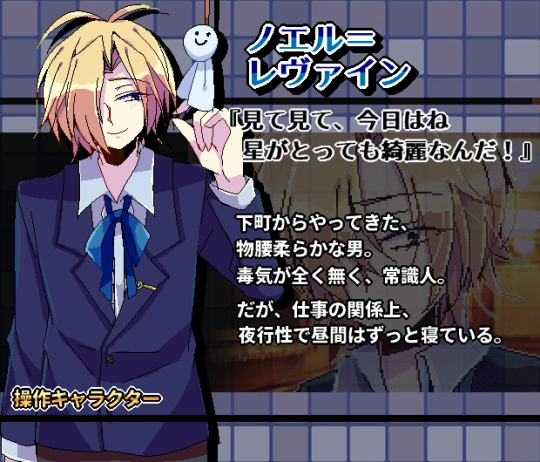
『魔女ドロシー』のことを崇拝しており
彼女の話題には過敏に反応する。
Noel Levine
"Look, look.
The stars are so beautiful tonight!"
A soft-spoken man from downtown.
He is a sensible man with no venom in his voice.
However, due to his work, he is nocturnal and sleeps all day long.
ノエル
レヴァイン
「見て見て、今日はね
星がとっても綺麗なんだ!』
[ Obsessed with Noel being from downtown... And Sirius' hysteria ]
下町からやってきた、
物腰柔らかな男。
毒気が全く無く、常識人。
だが、仕事の関係上、
夜行性で昼間はずっと寝ている。
#witchs heart#witch's heart#claire elford#ashe bradley#wilardo adler#sirius gibson#noel levine#illym translation
34 notes
·
View notes
Text
シスタークラリスの奇妙な一夜
Sister Clarith's Curious Night (Nervous Night)
彼女がそのレストランを訪れたのは
She had visited this restaurant
行方不明の子供たちを探すためだった
To search for some missing children
噂を聞いたのだ
She had heard a rumor
孤児院の子がこの店に入っていくという
That the children of the orphanage had been seen
その姿を見たと
Entering this establishment
.
しかし応対した支配人の男は
But the manager who came to receive her
残念そうに首を横に振る
Regretfully shook his head
「そのような心当たりはありませんね」
"I wouldn't know anything about that"
それを聞いてがっくりと
Upon hearing that, the Sister
肩を落とすシスター
Dropped her shoulders, crestfallen
.
すると支配人は彼女を
When she did, the manager
レストランの一番良い席に座らせた
Ushered her over to sit in the best seat in the restaurant
「せっかくですから
"Since you're here
何か食べていってください
Please, have something to eat
......ああ お代なら結構ですから」
...Ah, it's on the house"
.
ありがたきお言葉
I'm quite grateful to hear that
実は昨日から
The truth is,
何も食べていません
I haven't eaten since yesterday
子供たちが心配で
Out of worry for the children
.
厚意に甘える事にしたシスターの前に
The Sister decided to presume upon his kindness
やがておいしそうな料理が運ばれてきた
And eventually she was brought a delicious-looking meal
白身魚のソテーだろうか それを見て
It looked like a sauteed white fish; when she saw it
彼女は申し訳なさそうに
She apologetically
うつむいてしまった
Cast her eyes down
.
「教えにより
"According to our teachings,
生き物の肉は口にできないのです」
I mustn't partake of the flesh of anything living."
シスターがそう断っても
Though the Sister demurred,
支配人は引き下がらない
The manager was persistent
「そんなことをおっしゃらず
"Now don't be that way,
ここは神の目も届かぬ森の中ですから」
The eyes of your god can't reach you here in the forest"
.
仕方なくシスターは
Reluctantly, the sister
ナイフで魚の身を切る
Cut into the fish's body with a knife
一口だけ食べて帰ろう
She'd just take one bite and head home
そんな風に考えていたところ
But as she was thinking this
彼女は料理の中に
She discovered that
何か固い物がある事に気が付いた
There was something hard inside the meal
.
シスターの顔が青ざめる
The Sister's face paled
それはレーナが身に着けていた
That was a brooch that Lena
ブローチだった
Had always worn on her person
泳ぐのが得意なレーナが
Lena was good at swimming, and
海で集めた小石を
She had made it herself
組み合わせて作った手作りの物だ
By joining together pebbles she'd gathered from the sea
.
どうしてこんな物が
What is something like this
料理の中にあるの?
Doing inside this dish?
少なくともあの子は
At the very least, that child
この場所に来ていた
Must have come to this place
.
ふと気が付くといつのまにか支配人の姿は
She suddenly noticed that the manager
店内のどこにも見えなくなっていた
Was nowhere to be seen inside the restaurant
胸騒ぎを覚えた彼女は思わず席を立ち
With a sense of unease she unthinkingly stood from her seat
店の奥へと忍び込んでいったのだ
And crept further into the back
.
途中の廊下で小さな靴が落ちていた
Partway through the hallway she found a small dropped shoe
シスターは再び青ざめる
The sister paled once again
それはマルクの靴だった
That was Mark's shoe
彼の足が速かったことを彼女は思い出す
She recalled that he'd been a fast runner
.
ひときわ異臭が漏れる扉の前に立ち
She stood before a door leaking a notably pungent odor
シスターは恐る恐るそれを押し開ける
The Sister timidly pushed it open
そこは血と肉のこびりついた調理場
Inside was a kitchen splattered with blood and meat
コックの顔をした男の顔は
The face of the man who looked to be the cook
毛むくじゃらだった
Was covered in thick fur
.
二本足で立つ
You, dog man who
犬の獣人よ
Stands on two legs
包丁についた血は
That blood on your kitchen knife
いったい誰の物?
Just who does it belong to?
.
作業台の上で赤い猫が
On the work counter, a red cat
皿のシチューを舐めている
Was licking up a bowl of stew
浮かんでいる具材は
The ingredients floating in it
間違いなく人間の指だ
Were, without a doubt, human fingers
無数の指の中の一つ
Among the countless fingers
そこにはめられた指輪を
The sister found one
シスターは見つけた
That was wearing a ring
.
あれはエマの物で間違いない
She was certain that it belonged to Emma
恐ろしい想像がシスターの脳裏を駆け巡る
A dreadful image flashed through the Sister's mind
振り返ったシスターの前に立っていたのは
When she turned around, standing before her were
二羽のウサギと巨大な熊だった
Two rabbits and an enormous bear
.
シスターは叫び声をあげ
The Sister let out a scream
その場に倒れこんだ
And collapsed on the spot
薄れゆく意識の中
In her fading consciousness
徐々に迫ってくる絶望の足音
Despairing footsteps steadily encroached on her
気を失う直前 彼女が見たのは
Right before she passed out, she saw
額に角を生やした少女の顔だった
The face of a girl with a horn on her forehead
.
目を覚ました時
When she awoke
彼女は孤児院に帰ってきていた
She had returned to the orphanage
そしてその後
And shortly after
行方不明の子供たちも全員
All of the missing children
無事に孤児院へ戻ってきたのだ
Safely came back as well
.
子供たちは数日間の記憶を失っており
The children had no memory of the past few days
そして とてもお腹を空かせていた
And they were very hungry
レーナやマルクたちが唯一覚えていたのは
The only thing Lena and Mark and the others could recall
フルートを持った
Was a pair of twin rabbits
双子のウサギの姿だけだった
Who had been holding a flute
.
あのレストランは建物ごと
That restaurant, and the building it was in
森の中から姿を消した
Vanished from the forest
まるで最初から
It was as though
存在していなかったかのように
It had never existed in the first place
そして
And
平穏な日常が戻る
Their peaceful days returned
.
子供たちのためにおやつの
While baking some brioche
ブリオッシュを焼きながら
For the children's' snack
シスターはこんなことを考えていた
The Sister began to wonder
.
もしもあの時
If, back then,
出された料理を口にしていたならば...
I had actually eaten any of the meal that had been set out...
私は一体どうなっていたのだろうか?
Just what in the world would have happened to me?
#()songs#()mothy#()E.A.T.#the thing you need to keep in mind is that most of this one is spoken and not sung#unfortunately the music is very good and a big part of it so you are missing out on that a little
58 notes
·
View notes
Text
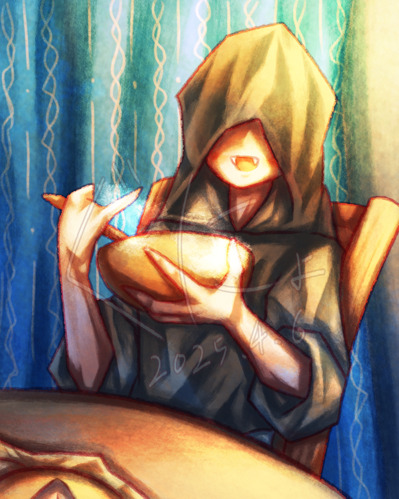
‘I am happy to dine with you.’ 「一緒に食べると美味しいね」
I've been living with a neighbourhood ghoul for a few months now. The food he prepares is very tasty, especially the meat dishes, which are better than in a casual restaurant. My life is full of happiness, and I jog home every day because I can't wait for his ‘welcome home’ and home-cooked meals. It is a lie that not so long ago I was lonely, bored and even frustrated by the sounds of my next door' lives. Now I don't have time to think about such trivial things and can concentrate only on the happiness in front of me. Come to think of it, I don't think I've even felt any sign of my next doors' recently, let alone the sounds of their lives. This warm and lively communal life must be drowning out the noise. 近所の食屍鬼と同棲を始めて早数か月 彼の作る料理はとても美味しく、特に肉料理は下手な飲食店よりもおいしい 私の生活は幸せに満ち溢れ、彼の「おかえり」と手料理が待ち遠しくて毎日足早に帰宅している 少し前まで孤独と退屈さ、それに油を注ぐかのような隣人の生活音にいら立ちを感じていたことが嘘のようだ 今ではそんなつまらない事を考える暇などなく、目の前の幸せだけに集中できるようになった そういえば最近、隣人の生活音はおろか気配すら感じなくなった気がする 温かくにぎやかなこの共同生活が、煩わしいノイズをかき消してくれているのだろう
3 notes
·
View notes
Photo


✿ ガスパチョ
#cook:ガスパチョ#本:せんぽ東京高輪病院 500kcal台のけんこう定食#cook:汁物#cook:トマト#cook:たまねぎ#cook:きゅうり#cook:2025〜#cook#cook:にんにく#cook:ワインビネガー#cook:白ワイン×白ワインビネガー×にんにく×レモン汁#cook:白ワイン×にんにく×レモン汁×ワインビネガー#cook:汁物:トマト#79kcal#50kcal〜
0 notes
Text
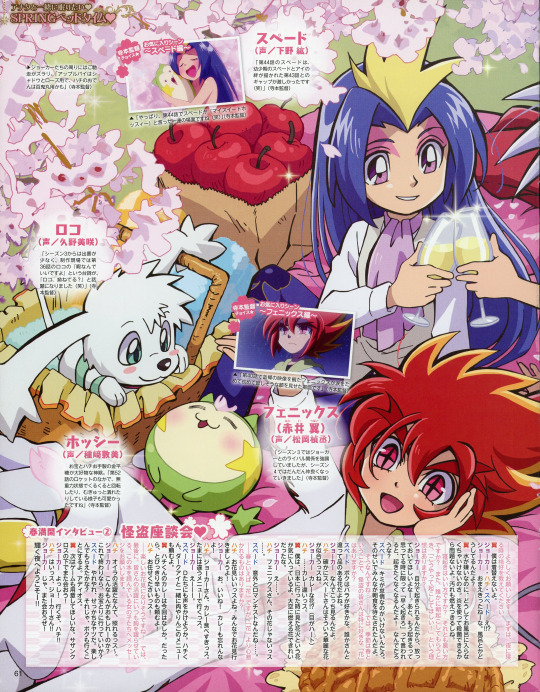

Otomedia Plus + SPRING 2017
(Below is a cleaned up machine translation. Please note that due to the nature of machine translation, the text may not be wholly accurate or may read oddly. Japanese is included after English for reference. The text was lifted from the images using this site, and though there's been care taken to make sure everything is correct, there is a chance of unintentional typos.)
I want to sleep together with you ♡ Spring Bedtime
アナタと一緒に眠りたい♡ SPRING ベッドタイム
~
Character Bio
Joker (Voice: Ayumu Murase) By making Joker frustrated with Hosshi, we got to see the Joker's funny, impatient faces in Season 3-4. (Director Teramoto)
ジョーカー (声/村瀬歩) 「ジョーカーにホッシーへ の苦手意識を持たせたこと で、シーズン3.4ではジ ョーカーの焦った面白い顔 が見れました」(寺本監督)
Hachi (Voice: Yumiko Kobayashi) Hachi is now "Hachi the Phantom Thief Apprentice" and is on the same advance notice as Joker, but one day we may be able to call him "Hachi the Phantom Thief". (Director Teramoto) ハチ (声/小林由美子) 「今は“怪盗見習いハチ” でジョーカーと一緒の予告 状ですが、 いつか “怪盗ハ チ” と言える日が来るかも しれませんね」 (寺本監督)
Spade (Voice: Hiro Shimono) In episode 44, Spade's bond with Ai alongside Spade's childhood was depicted, and the gap between episode 43 and 44 is quite drastic (laughs). (Director Teramoto)
スペード (声/下野紘) 「第44話のスペードは、 幼少期のスペードとアイの 絆が描かれた第43話との ギャップが激しかったです (笑)」 (寺本監督)
Phoenix (Voice: Yoshitsugu Matsuoka) In Season 3, the rivalry between Phoenix and Joker was emphasized, but in Season 4, the two became gradually closer.
フェニックス (赤井翼) (声/松岡禎丞) 「シーズン3ではジョーカ ーとのライバル関係を強調 していましたが、シーズン 4ではだんだん仲良くなっていきました」 (寺本監督)
Hosshi (Voice: Atsumi Tanezaki) Hosshi is a divine beast that loves treasures and Hachi's homemade kompeito. In the rocket in episode 52, the way it spins around and squishes in a gravity-free state was also very cute.
ホッシー (声種崎敦美) お宝とハチお手製の金平 糖が大好物な神獣。 「第52 話のロケット���なかで、無 重力状態でくるくると回転 したり、むぎゅっと潰れた りしている様子も可愛かっ たですね」 (寺本監督)
Roko (Voice / Misaki Kuno) Since season 3 he's had few appearances so at the production site Roko’s line in episode 36, "I'm free so it's okay" became a hot topic, "'Roko, are you sulking?' (laughs)" (Director Teramoto)
ロコ (声/ 久野美咲) 「シーズン3からは出番が少なく、 制作現場では第 36話のロコの『暇なんで いいですよ』 という台詞が、 『ロコ、拗ねてる?」 と話 題になりました(笑)」(寺本監督)
~
Main
(Top left note) Joker and friends are surrounded by tasty food. The apple pie is for Shadow and Rose, and Hachi's oden is probably for Hyakkimaru (Director Teramoto)
ジョーカーたちの周りにはご馳 走がズラリ。 「アップルパイはシ ャドウとローズ用で、ハチのおでんは百鬼丸用かも」 (寺本監督)
Joker and company have finished their adventures in Season 4 so now we're here. It's Japan in Spring, where the cherry blossoms are in full bloom! It seems that everyone is enjoying Hanami (cherry blossom viewing) while feasting on Hachi's cooking. I wonder what kind of festivities they have in store, Director Yukiyo Teramoto!
"March 13th is Spade's birthday and April 13th is President D's birthday, so this could be a celebration for them as well. The apples may have been a gift from D."
I want to keep watching the peaceful atmosphere of the phantom thieves, but they must be waiting for the next treasure!! Until we see Joker and his friends again, 'smile and au revoir'!
シーズン4での冒険を終えたジョーカーご一行が、本日やって来た場所。それは、桜咲く春の日本! ハチの料理に舌鼓を打ちつつ、みんなでお花見をしているようです。一体どんなお祭り騒ぎになっているんでしょうね、寺本幸代監督! 「3月13日がスペードの誕生日、4月13 日がプレジデントDの誕生日なので、 ふたりのお祝いも兼ねているのかもしれま せんね。ほかのみんなも続々と集まって きて、りんごはDからの差し入れかも」 穏やかな雰囲気の怪盗たちをずっと見 ていたいけど、彼らには次なるお宝が待 っているハズ!! またジョーカーたちに 会える日まで、笑顔でオ・ルボワール!
Spring Blossom Interview with Director Yukiyo Teramoto
春満開インタビュー 寺本幸代監督
Please tell us about the secret story behind the production of the final episode.
最終話の制作秘話を教えてください。
Finishing and shooting lasted all night for about three days, and it seems that I could see hallucinations by the end of it (laughs). I am relieved that we were able to broadcast the content that we were able to show. The trick that the passcode to unlock the missile is "HEART" was thought up by Naohiro Fukushima, in charge of screenwriting. I think the highlight was the scene where Joker writes his name on the spaceship and tells Phoenix, "Be sure to come back." I wonder when he wrote the name, but in the shot of the spaceship just before this scene, the name is obscured by light to disguise it. So the name was already written at that point.
最後は仕上げと撮影が3日間くらい徹夜して、 幻が見えたそうです(笑)。なんとかお見せでき る内容で放送することができて、ほっとしまし た。ミサイルの解除パスコードが 「HEART」 というトリックは、脚本の福島(直浩)さんが考 えてくれました。 ジョーカー的には宇宙船に名前 を書いて「必ず返しに来い」とフェニックスに言 うシーンが、見せどころだったと思います。いつ の間に名前を書いたのかと思いますが、そのシー ンに入る直前の宇宙船が映るカットでは名前を誤 魔化すために光を入れて見えなくしています。な ので、あの時点ではすでに書いてあるんですよ。
What was the most memorable moment for you other than the last episode?
最終話以外で、印象的だったことは?
There is a scene in the end of episode 50 where Spider Ace protects President D from a sniper's bullet and shows him the "DF" ring on his left hand, saying, "I have sworn my allegiance to President D." When the first picture came in, the ring on Spider Ace's middle finger was forgotten, so I asked for the picture to be redone and a ring to be added. Then somehow, I ended up with a picture of Spider Ace with the ring on his ring finger (laughs). The staff around me and I laughed hysterically and rushed to have it fixed.
第50話のラストでスナイパー幻魔の銃弾からプ レジデントDをかばったスパイダー・Aが、「オ レはプレジデントDに忠誠を誓ったんだ」と左手 の《DF》の指輪を見せる場面があります。最初 に絵が上がって来たときスパイダーAの中指に 指輪を描き忘れていたので、リテイクで指輪を追 加してもらったんですよ。そうしたらなぜか、ス パイダーAの薬指に指輪がはまった絵が上がっ て来てしまって(笑)。周りのスタッフたちと大 爆笑しつつ、慌てて直していただきました。
By the way, In this issue, we are looking into the sleeping habits of Joker and his friends! Who among them do you think is the best at getting up early?
ちなみに今号では、ジョーカーたちの睡眠事 情に迫っております! 彼らのなかで、早起きが 得意そうな人物は誰だと思いますか?
Hachi has to prepare food, so I think he wakes up early. It seems that Hyakkimaru is also living a proper life. It seems that Spider Ace, who is in a pumped up state after drinking coffee, will wake up early, but I feel that he will be weak in the morning if he hasn't.
ハチはご飯の支度があるので、早起きだと思い ます。百鬼丸もきっちり生活していそうですよ ね。コーヒーを飲んでヒャッハー状態のスパイダ Aも早起きそうですが、コーヒーを飲んでい ないヘタレ状態だと朝が弱そうな気がします。
Is there a character you would have liked to explore more?
では、もっと掘り下げて描いてみたかったキ ャラクターはいらっしゃいますか?
I wanted to depict how Spider Ace came to be loyal to D. I liked Spider Ace and Detective Wolfe in the original story, and I really wanted to have Detective Wolfe appear in episode 35, but there was no room for him, so I gave up on the idea. I am glad that I was able to create an interesting combination with D and Spider Ace, but I also wish I could have drawn those two in the story. With Dai Sato, who is in charge of the series composition, I was also thinking about a story about Dr. Neo's astronaut days. When he was young, he had a moment when he saw a spaceship that was disguised as a comet for a moment due to the influence of a solar flare, and from that moment he came to believe that aliens existed. It was a shame that we couldn't depict it. Neo knew Silver when he was young, and I wanted to depict that with Purple as well.
スパイダーAがDに忠誠を誓ったキッカケを 描きたかったです。 スパイダー・Aは原作でのウ ルフ刑事とのコンビが好きだったので、本当は第 35話でウルフ刑事も登場させたかったのですが、 入る隙間がなくて諦めました。そのおかげでDと スパイダー・Aという面白いコンビが出来たので よかったという思いもありますが、あのふたりも 描きたかったという気持ちもあります。シリーズ 構成の佐藤 大さんとは、ドクター・ネオの宇宙 飛行士時代のお話も考えていました。若かりしネ オが太陽フレアの影響で一瞬だけ彗星の変装が解 けた宇宙船を見た瞬間があり、そこから宇宙人は いると信じるようになったという設定だったのですが、これも描けなくてもったいなかったです。 ネオは若い頃のシルバーとも顔見知りなので、パプルも交えてその辺りを描きたかったですね。
Finally, please tell us what "Kaitou Joker" means to you, Director Teramoto.
最後に、寺本監督にとって『怪盗ジョーカとは、どんな存在なのかを教えてください。
For me, it is a special work that fulfilled my dream of directing an animated TV series. I myself have loved anime since I was a child, and even now as an adult, there are many works that I still remember as my favorites. There are still many stories I would like to tell from the original work, and if there is an opportunity, I would love to do a sequel. The staff also said that they would like to do a sequel, so I feel that "Kaitou Joker" is a work that is truly loved by everyone.
私にとっては、TVアニメの監督をやりたいと いう夢が叶った特別な作品です。私自身も小さい 頃からアニメが好きで、大人になった今も好きだ ったと思える作品がたくさんありますが、アニメ 『怪盗ジョーカー』を観てくれた子どもたちも大き くなり、いつかジョーカーたちを思い出すことが あるのかなと思うと、すごく感慨深いです。 まだ 原作でもやりたいお話がたくさんありますし、機 会があったら続編もぜひやりたいですね。スタッ フも「続編がやりたい」と言ってくださっている ので、『怪盗ジョーカー』は本当にみんなに愛され ている作品だと感じています。
Spring Blossom Interview 2: The Phantom Thief Roundtable Discussion
春満開インタビュー2 怪盗座談会
Nice to meet you! To start off, what do you dress in at bedtime?
よろしくお願いします! まずは、夜に寝る時の格好を教えてください
Tsubasa: I don't change my clothes.
翼 「僕は着替えないよ。」
Joker, Hachi, Spade: Huh!?
ジョーカー・ハチ・スペード 「え!!!」
Joker: That's so dirty. Do you even take baths?
ジョーカー 「おまえきったねーな。風呂とかどうしてるんだよ?」
Tsubasa: Why should I take a bath if I don't like water? You can use flames to sterilize, so there's no problem. Even the dirt burns off.
翼 「水が嫌いなのに、どうしてお風呂に入らなくちゃいけないのさ。炎を使って殺菌できるか ら問題ないよ。汚れも燃えつきるしね。」
Are you a good sleeper or a bad sleeper? Also, when you ask someone to wake you up in the morning, do you have a vision of how you want them to wake you up?
寝起きはいい方ですか? それとも悪い方 ですか? また、誰かに朝起こしてもらうと き、「こうやって起こしてほしい!」という理 想はありますか?
Joker: I can wake up on my own, so I wish people would stop pestering me. Also, when I'm ready to get up and someone tells me to hurry it up, I don't want to get up! I wonder why?
ジョーカー 「自分で起きられるんだから、放っ ておいてほしいよなー。あと、もう起きるって 思ってる時に限って「早く起きろ」って言われ ると、起きたくなくなるんだよ! なんでだろ うな?」
Spade: It's not good to so lazy. Because of that, everyone had to wait for breakfast.
スペード 「キミが怠惰なのがいけないんだろ。そのせいでみんなが朝食を待たされたんだよ。」
I see... So, since the season is Spring, do you phantom thieves have a particular favorite flower?
そうなんですね・・・・・・では、季節は春ということで、怪盗の皆さんは特に好きな「花」 はありますか?
Spade: I like roses. Unlike some people, I think roses are elegant flowers.
スペード 「ボクはバラが好きかな。誰かさんと 違って品のある花だよね。」
Joker: Why are you looking at me?
ジョーカー「なんでこっち見るんだよ。」
Hachi: Certainly, such gorgeous* flowers suit you, Spade-san.
ハチ「確かにスペードさんはそういう華麗な花が似合うっスね。」
Joker:A 'curry' flower!? (Heart eyes)
ジョーカー「カレーな花?!?(目がハート)」
Hachi: Not 'curry'.
ハチ「カレー違いっス。」
*Gorgeous (華麗), pronounced 'karei', which sounds similar to 'カレー' (karee, curry). The joke lost in translation is that Hachi has said a gorgeous flower, and Joker hears 'curry' because the word sounds similar.
Tsubasa: I like the flower called Hanabi that I saw when I went to Japan. It was a beautiful flower burning in the sky.
翼「僕は、日本に行った時に見た花火という花が気に入っているよ。 大空に燃える花できれい だったな。」
Joker:Huh......
ジョーカー「え······。」
Hachi: Phoenix-san, that isn't a flower.
ハチ「フェニックスさん、その花じゃないっス」
Spade: You're unexpectedly romantic....
スペード「意外とロマンチストなんだね・・・・・・。」
Spring is all about flowers, but is there anything that attracts you more than flowers?
春といえば「花」ですが、「花」より心惹 かれるものはありますか?
Hachi: Cherry blossom viewing is great, isn't it? Let's all go to hanami together!
ハチ「お花見いいっスよね。みんなでお花見行 きましょうよ!」
Joker: Oh, nice! Don't forget the curry!
ジョーカー「お、いいね! カレーも忘れんな よ!」
Hachi: Joker-san, you eat too much curry. I'd like a different menu once in a while.
ハチ「ジョーカーさん、カレー食べすぎっス。たまには違うメニューで行くっス。」
Joker: Ehhh......
ジョーカー「えー――。」
Spade: I'll ask D and the others to join us. Hachi, Dark Eye and I would like to request to have meat and apples on the menu.
スペード「Dたちにも声をかけようか。ハチく ん、ダークアイと一緒に肉やりんごのメニュー も頼むよ。」
Tsubasa: No curry from Hachi this time? In that case, I'll request something extra spicy!
翼「ハチくんのカレーは今回はなしか。だったら、とびっきり辛いものも頼むよ!」
Hachi: Leave it to me!
ハチ「お任せくださいっス!」
It's going to be a fun hanami! Lastly, please give a message to the girls reading this book, who are always excited to read about your great activities.
楽しいお花見になりそうですね!では、最後に。皆さんの活躍にいつも胸を躍らせてい る、この本を読んでいる女の子たちへメッセー ジをお願いします。
Hachi: It's a little embarrassing to hear that I'm doing so well~
ハチ「オイラの活躍だなんて、照れるっス~。」
Joker: Is this really that interesting? If this is the end, can I go find a treasure?
ジョーカー「こんなもんがおもしれーのか? これで終わりなら、お宝とりに行っていいか?」
Spade: Yeesh, he's so impatient. I hope you've had fun. Well, I'll be on my way, too. Adios.
スペード「やれやれ、せっかちなヤツだ。楽しんでもらえたかな? それじゃ、ボクも行くこ とにするよ。アディオス。」
Tsubasa: I hope there's games next time. See you under the Southern Cross!
翼「次はゲームも用意してほしいな。サザンクロスの下でまた会おう!」
Joker: Alright! Let's go, Hachi!!!
ジョーカー「よっし!行くぞ、 ハチ!!!」
Hachi: Yes, Joker-san!!
ハチ「はいっス、ジョーカーさん!!」
Joker: See you next time! Welcome to the Shining Night!!
ジョーカー「じゃ、また会おうぜ!輝く夜へようこそー!!」
33 notes
·
View notes
Text
2025年2月15日(土)

かつては落語を聴くのは夜というイメージだったが、近頃の私には夜遅くに電車に乗るのは辛いので、もっぱら昼間の会がありがたい。このところ、天満天神繁昌亭で開催される<月刊笑福亭たま>の朝席バージョンがお気に入りだ。10時開演、12時過ぎには終演、自宅に戻って少し遅めのランチ+🍷をいただくのが楽しみだ。次回のチケットも既に予約済、次々回も忘れずに予約しなくては。

5時45分起床。
洗濯開始。

朝食を頂く。
洗濯物を干す。
珈琲をいれる。
8時過ぎに家を出て天満天神繁昌亭へ、普段は阪急桂駅から乗車するが、バスの都合で西院駅から準急に乗って南森町駅へ。

今日の席は最前列、少し見上げねばならないが、前の席を気にしなくていいのは結構なこと。この会の楽しみは、たま師の一席目のマクラ、他では言えないことが聞けるのでいつも楽しみにしている。
終演後はまっすぐ帰宅、キャベツ焼き(具のないお好み焼き)+🍷いただきながら録画番組鑑賞。
桂そうば「親子酒」
初回放送日:2025年2月15日 土曜の早朝は関西の笑いをたっぷりと!▽3月に「二代目桂惣兵衛」を襲名する桂そうばの落語「親子酒」▽らくご男子Vロケ企画第4弾・桂團治郎&桂あおばが千早赤阪村へ!
名探偵ポワロ
第1話「コックを捜せ」/ The Adventure of Clapham Cookシーズン 1, エピソード 1 ある朝、ヘイスティングスは新聞に掲載された事件をポワロに読んで聞かせるが、どれもポワロの興味を引かず、手持ちぶさた状態。そんな時、ポワロを尋ねて トッド夫人が事件捜査の依頼にやって来る。彼女は居なくなったコックのイライザを捜して欲しいと相談を持ちかける。渋るポワロだったが、依頼を引き受ける ことに。
彼女は買物へ、私は午睡。
夕飯は無水地鶏カレー、ストウブで野菜の無水煮を先ず作り、そこへ奥川ファームの地鶏もも肉をいれ、しばらくにてから肉をほぐして味付けする。前半は私の作業、後半の仕上げは彼女が得意。

息子たちにはスパークリングワイン、我々は🍶+🍷。
録画番組視聴、名探偵ポワロ。
第2話「ミューズ街の殺人」/ Murder in the Mews��ーズン 1, エピソード 2 300年続いている花火大会の夜、事件は起こる。その夜、ジャップ警部、ヘイスティングス、ポワロは夜空に上がる花火を見上げながら、こんな夜は殺人が起 きても銃声がかき消してしまうだろう、と話していた。翌朝、ポワロはジャップ警部からの電話で現場へ呼び出される。そこには、拳銃で頭を撃ちぬかれた女性 の遺体が!彼女は自殺か?他殺か?
第3話「ジョニー・ウェイバリー誘拐事件」/ The Adventure of Jonnie Waverlyシーズン 1, エピソード 3 ポワロは「金を払わなければ、明日12時、子供をさらう。」という脅迫文が届いた元大地主ウェイバリー氏から相談を受ける。脅迫はこれで2度目か3度目に なるという。ポワロはウェイバリー氏と共に、ジャップ警部のもとを訪れるが警部は本気で相手にしない。しかしポワロはこの事件の依頼を引き受ける。予告通 り、ジョニーが誘拐される。
片付け、入浴、体重は200g増。
パジャマに着替え、角ロック舐めながら日誌書く。

帰宅してから外に出ず、暖かかったので本当はウォーキングに出るべきだった。
3 notes
·
View notes
Text
2024/7/28

7月28日 昨日は体の熱が引かなくて、エアコンを23℃まで下げてしまった。夜中にOS1を飲んだ。 今日は2件予定があり、まず午前中の予定のために御徒町から蔵前を歩いた。 少し歩くと町内会の管轄が変わり、変わるたびにラジオ体操の開催案内が掲示されている。それぞれ開催場所の公演と期間が異なっていたので、うまく町内会を梯子すれば夏休み中ずっとラジオ体操ができそう。 私の実家の町は、夏休みの終わりの1週間だけだった気がする。終わりの日にはお菓子の詰め合わせをもらえた気がする。

蔵前は歩く度に違うお店を見つけられて楽しい。 今日はスパイスとチャイのお店を見つけた。 2月にちーちゃんと節分の豆を見た神社へ行くと、神社の事務所の扉が少し開いていて猫が出てきた。
神社の猫、って感じの、少し太々しい表情の猫だった。

1時間くらい街を歩いて、今日も暑すぎるせいか人が少ないことに気がつく。 それか、みんなオリンピックを見ているのかな?と、今日も、また?もう?オリンピックの年なの?!の気持ちでいっぱい。 (都庁へ行く度に、ずっとTokyo2020をやっているのを目にしているからかもしれない。)

神戸の友人から須磨の回転レストランに行った報告をもらう。 写真付きでとてもレトロな感じだった。 ポートタワーの回転レストランも復活したとのことで、久しぶりに関西へ行きたい気持ちになった。 でもうっかり発売開始時刻を逃してしまい、フジファブリックの大阪城ホールのチケットを取り損ねてしまった。

日々着々と入院のためにamazonで注文したものたちが届いている。 入院リストのもの、これで残すは入院中に読もうとリストに入れた坂口恭平の“cook”と三越にまつわる短編オムニバス小説の2冊。 でもじっくり本なんて読んで過ごせる自信はなく、チャート式とか2週間で完ペキ数学Ⅱ・B、みたいな問題集を用意した方がいい気がしている。

5 notes
·
View notes
Text
ガーリックポテト*Garlic Potatos

初めて作るガーリックポテト。定番のヨーロッパ田舎料理です。
ざく切りの玉ねぎをレンジで加熱(箸がすんなり通る位)それをフードプロセッサーでペースト状にします。深めのフライパンに多めのオリーブオイルを入れ、潰したニンニク、パンチェッタを常温から弱火でゆっくり火を通します。ニンニクの風味とパンチェッタの塩気、旨味が油に��染んだら、パンチェッタを取り出します。その油でパプリカをさっと炒め、取り出します。ニンニクだけを残したオリーブオイルに玉ねぎペーストを加えて弱火で加熱します。注意点は最初は水分が多いので焦げませんが、水分が減り飴色に近づくと焦げやすくなるので、鍋肌からずっと一定に飴色になるまで混ぜ続けましょう。
ニンジンもレンジで加熱しておきます。ジャガイモは好みで皮つき、皮無しどちらでもOKです。こちらもレンジで加熱しておきましょう。
飴色になった玉ねぎペーストに、ターメリックを加えます。そして、ニンジン、マッシュルーム、サラダ豆を加えます。スパイスはナツメグ、コリアンダーを加えます。ニンジンの角がとれるぐらいに炒めたら、白ワインを全体が浸るぐらい加えて火を強め蓋をします。
アルコールが飛んで玉ねぎペーストが全体に絡んだら、ジャガイモ、パンチェッタをフライパンに戻します。そして最後にパプリカを加えます。
ここで大切なことは、ジャガイモのホクホクした食感、パンチェッタの歯ごたえ、パプリカのシャキッとした食感を残すことです。
全体の色目、風味を確かめてターメリックを足しても良いでしょう。
そして最後に粉チーズで塩加減を調整し、クローブ、粗挽きコショー、そしてパセリを多めに加えます。好みでオレガノ、バジル、パプリカパウダー等を加えてもいいでしょう。
これで完成です。
常備菜として作り置きして、グラタン皿に盛りチーズを加えオーブントースターで温めたり、オムレツの中身として具材に使ったり、食べる毎にバリエーションが楽しめます。
パートナーからは[一生食べ続けられるほど美味しい]と称賛されました。
First time making garlic potatoes. A classic European country dish.
Heat roughly chopped onions in the microwave (to the point where chopsticks can easily pass through them), then use a food processor to make a paste. Put a large amount of olive oil in a deep frying pan, and slowly cook the crushed garlic and pancetta over low heat from room temperature. Once the garlic flavor and the salty, umami flavor of the pancetta have blended into the oil, remove the pancetta. Lightly fry the paprika in the oil and remove. Add the onion paste to the olive oil, leaving only the garlic, and heat over low heat.The thing to keep in mind is that it won't burn at first because it has a lot of moisture, but as the moisture decreases and it approaches a candy color, it will burn easily, so keep stirring until the skin of the pot becomes a candy color.
Heat the carrots in the microwave as well. You can use potatoes with or without skin, depending on your preference. Let's heat this up in the microwave too.
Add turmeric to the caramelized onion paste. Then add carrots, mushrooms and salad beans. Add nutmeg and coriander to the spices. Stir-fry the carrots until the corners come off, then add white wine until they are completely submerged, turn up the heat, and cover.
Once the alcohol has evaporated and the onion paste is fully coated, return the potatoes and pancetta to the frying pan. And finally add paprika.
You may want to check the overall color and flavor and add turmeric.
Finally, adjust the salt level with grated cheese, and add cloves, coarsely ground pepper, and plenty of parsley. You can also add oregano, basil, paprika powder, etc. if you like.
This completes the process.
You can make it as a regular dish, add cheese to a gratin dish and warm it up in the toaster oven, or use it as an ingredient in an omelet, or enjoy a variety each time you eat it.
My partner praised it, saying it was so delicious that I could keep eating it for the rest of my life.
材料
玉ねぎ 大2個 ジャガイモ 大4個 ニンジン 大1個 マッシュルーム 大5、6個 パプリカ 3、4個 ニンニク 5、6片
パンチェッタ
オリーブオイル 白ワイン 粉チーズ ターメリック ナツメグ コリアンダー
クローブ 粗挽きコショー
パセリ、オレガノ、バジル、パプリカパウダー等。
Ingredients
pen2 large onions
4 large potatoes
1 large carrot
5 or 6 large mushrooms
3 or 4 paprika
5-6 cloves of garlic
Panchetta
olive oil
white wine
powdered cheese
turmeric
nutmeg
coriander
cloves
coarsely ground pepper
Parsley, oregano, basil, paprika powder, etc.
2 notes
·
View notes